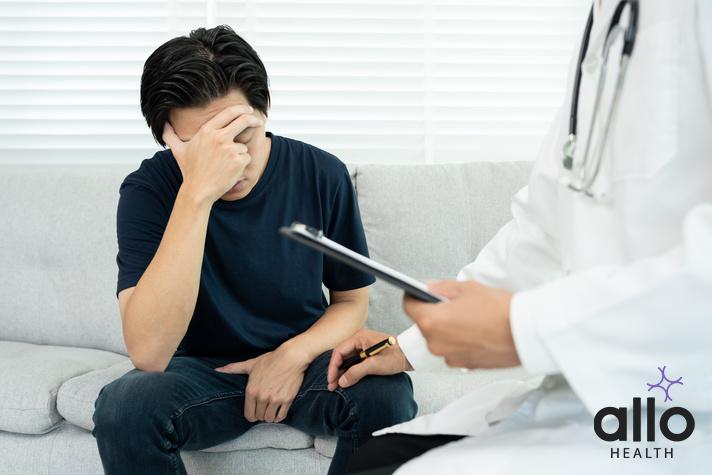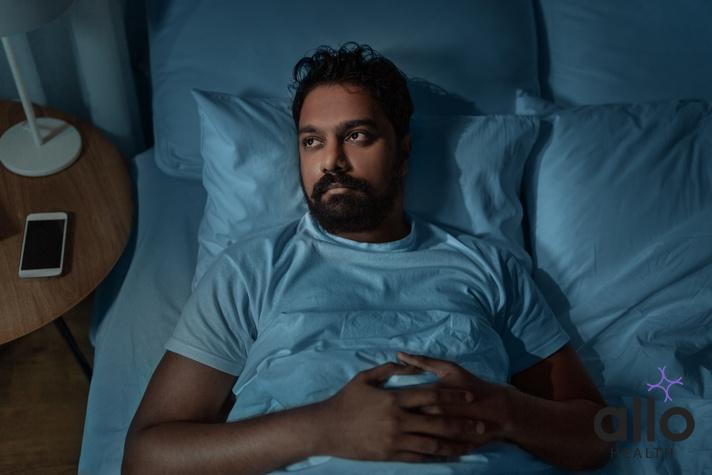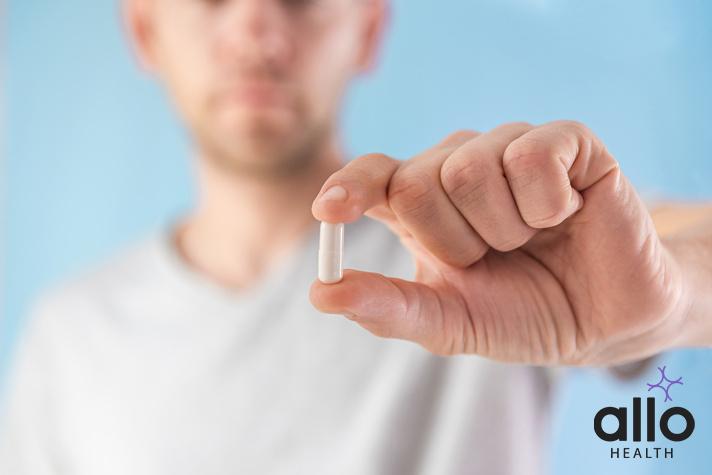Can Depression Cause Erectile Dysfunction?

Allo Health is dedicated to personalized well-being, offering support and trusted information tailored to individual health goals. The platform emphasizes human-generated content, led by a distinguished medical team of experts, including physicians and sexual health specialists. Their commitment to credibility involves rigorous fact-checking, authoritative research, and continuous updates to ensure accurate, up-to-date information. Allo Health's unique approach goes beyond conventional platforms, providing expert-led insights and a continuous commitment to excellence, with user feedback playing a crucial role in shaping the platform's authoritative voice.

Dr Sanina Mansoor holds MBBS degree from Yenepoya university,Mangalore.She has 8 years of experience working as a medical officer at various health centres and medical colleges.
Why This Was Upated?
Our experts continually monitor the health and wellness space, and we update our articles when new information became available.
Updated on 17 April, 2024
- Article was updated as part of our commitment to diversity, equity, and inclusion.

"The following blog article provides general information and insights on various topics. However, it is important to note that the information presented is not intended as professional advice in any specific field or area. The content of this blog is for general educational and informational purposes only.
Book consultation
The content should not be interpreted as endorsement, recommendation, or guarantee of any product, service, or information mentioned. Readers are solely responsible for the decisions and actions they take based on the information provided in this blog. It is essential to exercise individual judgment, critical thinking, and personal responsibility when applying or implementing any information or suggestions discussed in the blog."
Depression can negatively impact many aspects of your life — from feeling unable to do everyday activities to affecting your overall quality of life. So if you’re dealing with depression and also experiencing erectile dysfunction (ED), you might wonder: Can depression cause erectile dysfunction? In this article we’ll explore the connection between depression and erectile dysfunction, including ways to treat either condition.
What is Depression?
Depression is a common and serious mood disorder that affects how a person feels, thinks, and handles daily activities. It’s more than just feeling sad or going through a rough patch; it’s a serious mental health condition that requires understanding and medical care.
Symptoms of Depression
- Persistent Sadness or Low Mood: This is more than just feeling blue; it’s a profound sadness that doesn’t go away.
- Loss of Interest or Pleasure: Activities that were once enjoyable no longer bring any pleasure.
- Changes in Appetite: Significant weight loss or gain not due to dieting.
- Sleep Disturbances: This can include insomnia or sleeping too much.
- Fatigue or Loss of Energy: Feeling excessively tired almost every day.
- Feelings of Worthlessness or Guilt: Harsh criticism of perceived faults and mistakes.
- Difficulty in Thinking, Concentrating, or Making Decisions: This includes trouble focusing and indecisiveness.
- Unexplained Physical Symptoms: Such as headaches or body aches that do not have a clear physical cause.
It’s important to recognize that these symptoms can vary in intensity and duration, and not everyone with depression will experience all of these symptoms. If you or someone you know is experiencing these symptoms, it is crucial to seek help from a health professional. Depression is treatable, and early intervention can improve outcomes.
Can Depression Cause Erectile Dysfunction?
Yes, depression can indeed cause erectile dysfunction (ED), and understanding this connection is crucial for effective treatment and management.
Relationship Between Depression and Erectile Dysfunction
- Psychological Factors: Depression is often accompanied by psychological factors such as feelings of hopelessness and low self-esteem, which can lead to performance anxiety, affecting sexual behavior and function.
- Physical Symptoms of Depression: Depression can manifest physical symptoms that impact sexual health, including changes in blood flow and hormone levels, particularly testosterone levels, which are crucial for sexual function. Moreover, depression is often associated with other health conditions like cardiovascular disease, which can further impair erectile function.
- Selective Serotonin Reuptake Inhibitors (SSRIs): These antidepressant medications, commonly used in the treatment of various types of depression including major depression and bipolar disorder, can have sexual side effects, one of which is erectile dysfunction.
- Impact on Quality of Life: The symptoms of depression can significantly impair quality of life, which in turn can exacerbate sexual dysfunction. This is particularly relevant in people with depression who experience decreased sexual activity and interest.
- Depends on Each Other: The link between depression and erectile dysfunction is bidirectional. Depression can lead to ED, and the presence of ED can exacerbate depressive symptoms. This cycle can impact a person’s quality of life, leading to increased rates of depression and incidence of erectile dysfunction.
Impact of Erectile Dysfunction on People with Depression

The impact of erectile dysfunction (ED) on people with depression is multifaceted, influencing both mental and physical aspects of health.
- Psychological Impact and Quality of Life: Erectile dysfunction can exacerbate depressive symptoms, such as feelings of hopelessness and low self-esteem, especially when it affects sexual performance and satisfaction. This can lead to a further decline in mental health conditions, contributing to a cycle where depressive disorder and sexual dysfunction reinforce each other.
- Relationship and Self-Image Concerns: Depressive symptoms, including low mood and decreased interest in activities, can strain relationships. When ED is present, this strain can intensify, potentially leading to performance anxiety and further decreasing the quality of life. The combination of depression and sexual dysfunction often impacts a person’s self-image and confidence.
- Impact on Treatment and Recovery: Patients with erectile dysfunction and depression might experience challenges in their treatment journey. The sexual side effects of certain antidepressant medications, particularly selective serotonin reuptake inhibitors, can worsen ED, making it difficult for patients to adhere to depression treatments.
- Physical Health Considerations: Depression and ED both involve physical symptoms and health conditions like altered blood flow and hormone levels, including testosterone levels. These changes can have a significant impact on sexual activity and overall physical health.
- Seeking Medical Advice: It is crucial for individuals experiencing both depressive symptoms and erectile dysfunction to seek medical attention. Health professionals can offer doctor-approved health tips and effective treatments tailored to address both conditions simultaneously, thereby improving the individual’s overall well-being and sexual health.
The impact of erectile dysfunction on people with depression is significant, affecting emotional well-being, relationships, treatment effectiveness, and physical health. It’s essential to recognize these challenges and seek comprehensive medical advice to manage these interconnected conditions effectively.
Diagnosis and Treatment of Erectile Dysfunction Due to Depression

Diagnosing and treating erectile dysfunction (ED) in the context of depression involves a comprehensive approach that addresses both mental health conditions and physical symptoms.
Diagnosis
- Understanding the Symptoms: The diagnosis of depression and its impact on sexual function starts with recognizing the symptoms of depression, which can include feelings of hopelessness, sadness, and a lack of interest in daily activities. These psychological factors can significantly affect sexual behavior and desire.
- Assessing Erectile Dysfunction: Medical professionals assess erectile dysfunction by evaluating sexual performance anxiety, sexual intercourse difficulties, and overall sexual activity. This evaluation often includes discussing medical conditions that might contribute to ED, such as cardiovascular disease, and exploring mental health conditions like major depression or bipolar disorder.
- Evaluating Medication Effects: For patients undergoing treatment for depression, doctors consider the sexual side effects of antidepressant medications, especially selective serotonin reuptake inhibitors (SSRIs). These medications can play a significant role in sexual dysfunction.
Treatment
- Addressing Psychological Factors: Effective treatments often involve addressing the psychological factors contributing to both depression and ED. This can include therapy options like cognitive-behavioral therapy or couples therapy to manage performance anxiety and improve sexual function.
- Medical Approaches: Treatment of erectile dysfunction might involve adjusting antidepressant medication or prescribing ED-specific treatments. Health professionals carefully consider the impact of any medication change on depressive symptoms and sexual function.
- Lifestyle Interventions: Doctor-approved health tips often include recommendations for physical activity, dietary changes, and other lifestyle adjustments. Improving physical health can positively impact blood flow, testosterone levels, and overall sexual health, thereby reducing the symptoms of ED.
- Seeking Professional Help: It’s crucial for patients with erectile dysfunction and depressive disorder to seek medical attention. Medical professionals can offer a range of potential solutions, from medication adjustments to therapy, tailored to individual needs.
The diagnosis and treatment of erectile dysfunction in the context of depression require a multifaceted approach, encompassing a thorough understanding of both the psychological and physical aspects, alongside a collaborative effort between patients and their healthcare providers.
Conclusion
The relationship between depression and erectile dysfunction is complex, involving a mix of psychological factors, health conditions, and medical treatments. Understanding and addressing these aspects can lead to more effective treatments and improved quality of life for those affected.
Most Asked Questions
-
Can feeling sad all the time lead to problems in my sex life?
Yes, constant feelings of sadness or hopelessness, common in depression, can impact your sex life. This mood disorder can reduce your interest in sexual activity and even lead to erectile dysfunction.
-
Do medications for mood swings affect sexual performance?
Medications like SSRIs, often prescribed for mood disorders such as depression and bipolar disorder, can have side effects that affect your sexual performance, including causing erectile dysfunction.
-
If I’m dealing with depression, should I talk to my doctor about my sex life too?
Yes. It’s important to discuss all aspects of your health with your doctor, including any changes in your sex life. This helps in finding the right treatment that addresses both your mental health and sexual function.
-
Are there ways to improve my sex life while treating my depression?
Yes, there are ways to improve your sex life. This can include adjustments in your treatment plan, lifestyle changes like increased physical activity, and even couples therapy to address any sexual performance anxiety. Your doctor can provide specific recommendations suited to your situation.






































